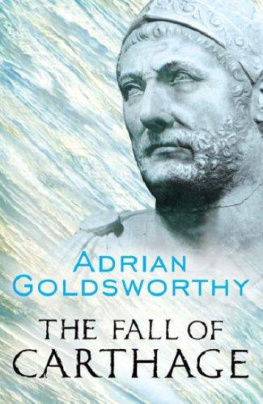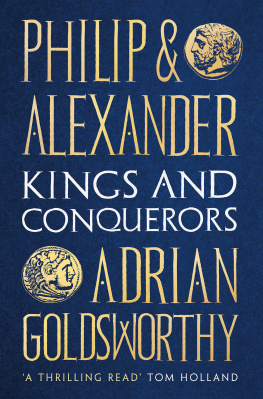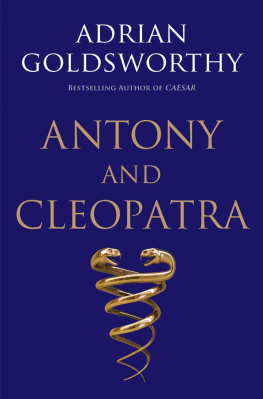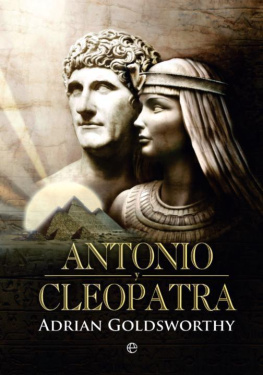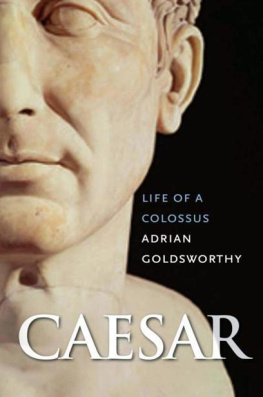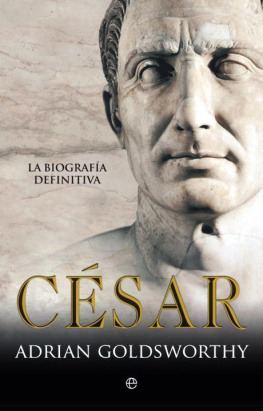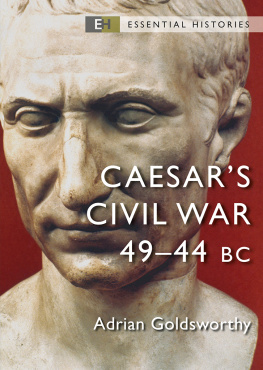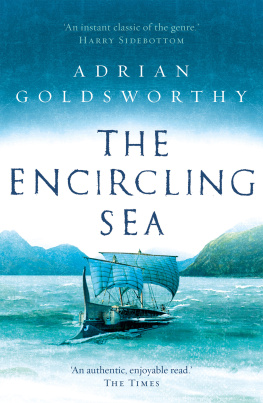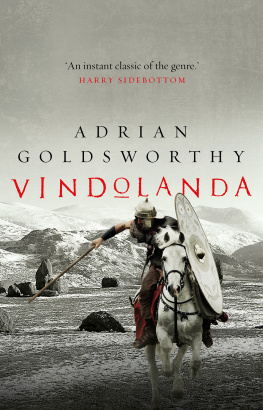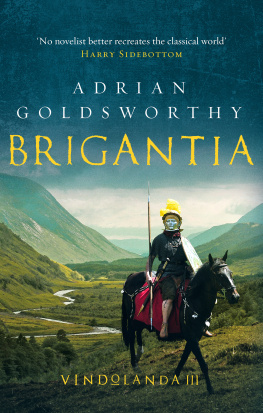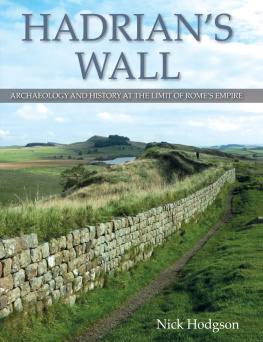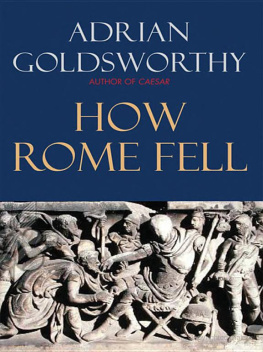Adrian Goldsworthy
VINDOLANDA
Bremenium: High Rochester
Bremesio: Piercebridge
Coria: Corbridge
Corinium: Cirencester
Eboracum: York
Gades: Cadiz in Spain
Londinium: London
Lugdunum: Lyon in France
Luguvallium: Carlisle
Magna: Carvoran
Trimontium: Newstead
11 September AD 98THE RIDERS CAME from the north, black shapes in the darkness, and the few people who saw them kept out of their way and did not dare to call out a challenge. A band of men abroad at this hour were more than likely warriors or thieves or both. These ones moved with purpose, and that could mean many things. They came suddenly into a dell, scattering the dozen sheep that were grazing there, and the shepherd yelled out in anger before fear made him fall silent. The horsemen rode past, ignoring him and his animals. Half an hour later they came to a shallow valley, and the men urged their tired mounts into a canter. It was nearly dawn.
There was a Roman outpost in the valley, but the sentry standing on the tower over its single gateway did not see them for some time. He was a Thracian, tired at the end of a long watch and not expecting anything to happen because nothing much ever happened here. There might be the odd feud and murder, and the inevitable thefts of livestock, but not any real trouble. With twenty-three years service under his belt, that was why the Thracian had applied for the posting. He had two more years left to go before his discharge. That meant becoming a Roman citizen, freedom from the armys rules, and After such a long time it was hard to picture life outside the army. He was not quite sure what it would mean, but wanted to live to find out, which meant that quiet was good, and at times it was so quiet here that it seemed the army and the wider world had forgotten all about them.
The outpost was as small and insignificant as any he had ever seen. For an army whose units loved to proclaim that they had built anything, the painted sign above the gate was unusual and merely stated that Legio II Adiutrix had made this burgus they did not say when or why, neither did any officer claim credit for supervising the work. The notice was plain and the lettering small, giving the impression that the legionaries were not proud of the deed, and the Thracian did not blame them, neither did he wonder why the whole legion had left Britannia and cleared off to the Danube soon afterwards. This was a half-forgotten dunghill in the middle of nowhere in the empires most northerly province, and II Adiutrix had not even bothered to do a decent job.
It was supposed to be eighty-five feet square, but the side walls were nearly a double pace different in length and the front and back not much better. Long hours of guard duty, day after day and night after night, meant that the Thracian knew every inch of the place, and every creak in the walkway and crack in the timber where the legionaries had used green wood because they had wanted the job over with and had not waited for seasoned supplies to arrive. One of the planks of the towers platform was spongy underfoot and would give way sooner or later. He had the happy hope that the new acting curator Crescens would be standing on it when it did. The Thracian smiled at the thought, turned to face the east and then raised hand to forehead and promised to pour a libation to the Rider God of his people if only it would happen.
As if in answer a sliver of burning orange light appeared over the top of the hill behind the fort and made him blink. Dawn was coming, and the Horseman was galloping through the heavens, his hound running alongside as they drove the stars from the sky and let the sun bring a fresh day to the world. A moment later he heard Crescens voice raised in anger, bawling at one of the slaves for no good reason.
Thats him, lord, the Thracian muttered. Know youre busy, but the bastard has it coming.
The little garrison was stirring, apart from the centurion whose quarters were set up against the far wall. No one had seen the officer for three days or heard him since the last burst of singing on the second morning. It happened every month or so, and by now the Thracian knew the pattern, and guessed that the centurion Flavius Ferox would be half sober by tonight, or maybe tomorrow morning.
Most of the time Ferox did not drink a lot by army standards, and did his job well. He was centurio regionarius, the centurion in charge of the region around here, tasked with keeping the peace and the rule of law, so that the army knew what was going on and the locals were content and willing to settle their disputes without lopping each others heads off. Ferox was a Briton, albeit from a tribe living far away in the south-west, and although men said that this was why the locals trusted him, the Thracian doubted that it was the main reason. The centurion was a hard man, grim-faced, but was known for keeping his word and never giving up. They told stories of how he had chased fugitives for weeks on end and over hundreds of miles and almost always got them. Once he went to the far north in the dead of winter and came back with a young warrior accused of raping and murdering the wife of a Roman trader and then testified at the trial on behalf of the captive and proved that he was innocent and the Roman guilty. Not everyone thanked him for that, but the warriors relatives did, and word spread that the centurion prized the truth. It did not matter too much, for they never caught the husband, who had slipped away to Gaul, protected by influential friends.
The Thracian did not know whether any of this was true, for the army always had far more rumours than it had soldiers. Men also said that Ferox had once been a great hero and perhaps that was true, for the harness he occasionally wore over his mail was heavy with disc-shaped phalerae, torcs and other awards for valour. Others whispered that he was unlucky, and that disasters seemed to happen when he was around, with legions cut to pieces by the Dacians and Germans.
All that was long ago. Ferox had been at this outpost for seven years and nothing bad had happened. Nothing much had happened at all. The Thracian did not know whether a weakness for drink was why the centurion had been sent here in the first place or whether the damp monotony since had turned him to it. Still, Ferox was a Briton and they were an odd lot, so perhaps he liked this hole and was just prone to melancholy. When he arrived, he had had someone paint a much bigger sign with the word SYRACVSE in tall elegant letters, and had had this nailed above the message left by II Adiutrix. No one even pretended to know why.
The light was growing, and it was nearly day, which meant that the Thracians four hours on guard would soon be over. Built for some fifty men and a dozen horses and mules, the outpost Syracuse now had less than half that number, and so Crescens had decided to inflict double watches on everyone since Ferox had shut himself away. The curator was parading his little power as garrison commander, picking on all those he did not like. Fortunately, that was just about everyone, so that the burden was shared. The man had barely served five years, but looked eager and could write in a clear hand, so would probably get promotion sooner or later, instead of this temporary post, which did not grant a man any permanent rank.
Stamping his feet to bring them back to life and taking care to step over the soft plank the Thracian went to the parapet on the outer side of the tower and looked out across the valley. The small village on the far side seemed quiet, although no doubt the women were stirring the hearth fires back into life. A few boys drove little clusters of cattle down to the stream.


